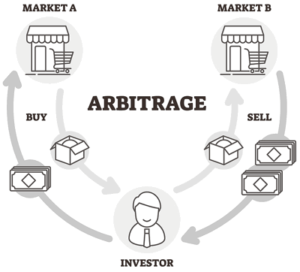 For many people, gambling is seen as a form of entertainment. We can debate the merits of this approach as much as we like, but the reality is that that is the mentality of a huge swathes of people that place bets. They enjoy the anticipation of the outcome as much as they enjoy it when they win, meaning that they will often place bets for the enjoyment of it as much as anything else.
For many people, gambling is seen as a form of entertainment. We can debate the merits of this approach as much as we like, but the reality is that that is the mentality of a huge swathes of people that place bets. They enjoy the anticipation of the outcome as much as they enjoy it when they win, meaning that they will often place bets for the enjoyment of it as much as anything else.
The truth of betting is such that these people will lose far more often than they win, but they won’t necessarily mind this because of their mentality. Ultimately many people are happy in the knowledge that they may lose over time as the bets they place enhance their engagement with the things they bet on. There is nothing wrong with that either, as long as you are aware of it and you can control how much you gamble and how much you spend so it remains a leisure activity and nothing more.
Professional gamblers will never place a bet for enjoyment alone. They need to remove themselves from any situation in which emotion might play a part in their decision making, instead focussing squarely on the idea that they are looking to make money. The only thing that matters is their profit at the end of the day, so they will look to mitigate any risks that they’re facing that might see that profit take a hit. The mindset of a professional gambler is such that they’re focused on the bottom line, with everything else taking a back seat.
It does take an appreciation of maths to become a successful bettor but it is possible for most people. The biggest difficulty is removing the ‘gut feeling’ and emotional nature of betting. Most so called professionals make money by hedging bets exploiting odds differences over time, this allows them to guarantee a small return from a given market. The same technique is used in the financial world. This is, however, very transactional and while it removes most of the risk it also removes the anticipation as now the result doesn’t matter. For many people this removes the point of placing a bet, which is to take a risk and make a guess. To be a professional you need to minimise risk but at the same time it defies the point for a lot of people.
Having A Sensible Strategy
 If you want to become a professional gambler then one of the first things that you’ll have to do is change your mindset. You will have to move away from the conventional idea of gambling being an entertainment activity and move towards thinking of it as an entirely serious enterprise. For professional bettors, gambling is nothing more than a numbers game. They crunch said numbers and place the bets that are likely to make them the most money, ignoring all other possibilities if they are likely to see them lose money for some reason.
If you want to become a professional gambler then one of the first things that you’ll have to do is change your mindset. You will have to move away from the conventional idea of gambling being an entertainment activity and move towards thinking of it as an entirely serious enterprise. For professional bettors, gambling is nothing more than a numbers game. They crunch said numbers and place the bets that are likely to make them the most money, ignoring all other possibilities if they are likely to see them lose money for some reason.
As a result of this, professional gamblers have a strategy with which they approach their betting and they stick to it at all times. Think of it as being like playing blackjack. People that play blackjack and follow basic strategy see the House Edge reduced a significant amount. This only works, though, if they always follow basic strategy. There is no room to change your approach based on a ‘feeling’ or a ‘sense’ that you’ve got that the dealer is going to go bust. You stick to basic strategy at all times and never veer from that path once.
The same sort of thing is true of professional gamblers. They have a strategy and they stick to it, knowing that, provided their sums are right, they’re going to win money more often than not. They can’t allow themselves to be carried away by emotions or feelings or a sense that something or other is going to happen. It is always about the strategy that they have devised that they feel will see them win more more often than they lose it. That doesn’t mean that they’ll never lose a bet, of course, but that they won’t lose their heads and change their approach when they do.
Betting Is Transactional
 For professional gamblers, betting is purely transactional. If they are the biggest Manchester City supporter in the world but know that City tend to lose their heads in the Champions League final, they will bet on City to lose the Champions League final. Their heart might be telling them that they want the Cityzens to win, but their head knows that they will probably bottle it when it comes to the crunch. There is nothing emotional in their decision-making, which is how they know that they’ll get it right more often than not.
For professional gamblers, betting is purely transactional. If they are the biggest Manchester City supporter in the world but know that City tend to lose their heads in the Champions League final, they will bet on City to lose the Champions League final. Their heart might be telling them that they want the Cityzens to win, but their head knows that they will probably bottle it when it comes to the crunch. There is nothing emotional in their decision-making, which is how they know that they’ll get it right more often than not.
When all you care about is the bottom line, you’re able to make betting into a purely transactional thing. That doesn’t mean that a professional punter won’t be annoyed when a big call goes against them or the team that they’re betting on doesn’t win, it’s just that they know that they crunched the numbers and things should have gone differently. They will weigh up their decision making and consider their approach, but provided they feel as though they’re doing exactly what they should, they won’t move away from what they know will be a winning strategy.
Thinking About The Bankroll
 How do you tend to fund your betting decisions? Do you pay money into your betting account on the fly, choosing to put £10, £20 or £50 in when you want to make a bet and then withdrawing your winnings when you can? There is obviously nothing wrong with that approach in theory, but it is not one that professional bettors are likely to take. Instead, they will think about their bankroll and respect it, knowing how much of it they are comfortable losing if the situation leads to that particular outcome at any given moment.
How do you tend to fund your betting decisions? Do you pay money into your betting account on the fly, choosing to put £10, £20 or £50 in when you want to make a bet and then withdrawing your winnings when you can? There is obviously nothing wrong with that approach in theory, but it is not one that professional bettors are likely to take. Instead, they will think about their bankroll and respect it, knowing how much of it they are comfortable losing if the situation leads to that particular outcome at any given moment.
What is the percentage of your bankroll that you’re going to bet with on each wager that you place? A professional punter will have a bankroll of, say, £1,000 and each bet that they place will be made up of somewhere between 2 and 5% of their bankroll total each time that they go to place it. This allows them to ensure that they can absorb their losses when they come around without panicking about it. It removes the risk of them losing all of their money and having to start again, with all professional punters keen to remove risk where they can.
As part of this process, professional gamblers tend to keep an excellent track of the bets that they’ve placed and the money that they’d won. Can you remember the last ten bets that you placed and what the outcome was? Do you have a note of it anywhere? A pro would certainly be able to find this information out relatively quickly, such is the extent to which they keep a good track of their money. This way, they are able to understand why their bankroll is what it is at any given moment, as well as what it should be in the future.
While betting is largely a numbers game it is also susceptible to variance. This means in spite of following a plan sometimes even professionals will feel the effect of bad luck and lose a series of bets (just as much as they can also go on a successful streak). This is what the bankroll is for, to protect against variance, over time they know that their accounts will regress towards the mean. All that matters to a professional is what their average gains will be if they follow a set strategy, the bankroll then allows them to achieve that while also taking into account outliers over time. This is very similar to how an investment firm would approach a market.
Exploiting Weak Lines
 The bread and butter of any professional is exploiting odds and backing all the possible outcomes at favourable odds to guarantee a return. It is not the only way serious punters operate, though, and any ‘professional’ will always be on the lookout for weak lines. This is a scenario where the odds of an outcome offered by a bookmaker or exchange is greater than the true odds. If you back markets like this over time then you can find value.
The bread and butter of any professional is exploiting odds and backing all the possible outcomes at favourable odds to guarantee a return. It is not the only way serious punters operate, though, and any ‘professional’ will always be on the lookout for weak lines. This is a scenario where the odds of an outcome offered by a bookmaker or exchange is greater than the true odds. If you back markets like this over time then you can find value.
The difficulty here is knowing what the true odds of something happening are, as inherently we can never be sure of an outcome. To get close to true odds, and therefore exploit weak lines, we have to have experience and a deep knowledge of the data and factors that affect an outcome. This requires a huge amount of research and dedication of time and for the reasons already discussed on this page it makes betting more of a job than a leisure pursuit. This is why gambling this way is only for certain people who are able to think a certain way.
Have Realistic Expectations
 As well as trying to avoid risk when and where they can, professional gamblers also try to have realistic expectations when it comes to how things are going to go. You would hard-pushed to find a professional punter that expects to make millions in one fell swoop. Instead, they will plan a long-term strategy that will hopefully see them winning modest amounts on a regular basis. It isn’t about ‘go big or go home’, but is actually about winning small amounts regularly in order to ensure that they can carry on betting for as long as possible.
As well as trying to avoid risk when and where they can, professional gamblers also try to have realistic expectations when it comes to how things are going to go. You would hard-pushed to find a professional punter that expects to make millions in one fell swoop. Instead, they will plan a long-term strategy that will hopefully see them winning modest amounts on a regular basis. It isn’t about ‘go big or go home’, but is actually about winning small amounts regularly in order to ensure that they can carry on betting for as long as possible.
The idea of having immediate satisfaction from your betting is great, but it isn’t realistic. A professional gambler is more likely to bet £1,000 in order to win £10 than they are to bet £10 in order to win £1,000. They will know that a winning streak doesn’t mean that they’re never going to lose but rather that the loss is just around the corner. By having this attitude, professionals are able to cope with the slings and arrows of outrageous fortune without losing their heads when things don’t go their way for some reason.
The chance of you becoming a professional gambler overnight is slim. If you don’t have an eye for numbers and a sensible approach to betting then you’ve got no chance. You need to take time to plan your strategy and put it into practice, testing it out for weaknesses and problems. If you’re the sort of person that unrealistically expects to be doing nothing but betting to make your money within a week of starting off, you’re only going to be disappointed. The key is to be calm, sensible and realistic in what you expect to happen.
It’s Not Easy To Keep Going
 Many people who try to make an income from betting will discover very quickly that it is difficult if you win regularly. Ultimately betting companies are private businesses and they can choose who they accept bets from. This means that if you win regularly and win large amounts you can expect to have your betting account limited very quickly. Some may say that is not fair but it is reality, bookies can and do pick and choose who they allow to bet with them.
Many people who try to make an income from betting will discover very quickly that it is difficult if you win regularly. Ultimately betting companies are private businesses and they can choose who they accept bets from. This means that if you win regularly and win large amounts you can expect to have your betting account limited very quickly. Some may say that is not fair but it is reality, bookies can and do pick and choose who they allow to bet with them.
Most serious punters use exchanges to bet as here the company charges a commission and you are betting, or offering bets to, other people. The exchange doesn’t care who wins as they get a commission every time. This is one method used by professionals and can be used to exploit odds changes. Such as, backing something at 5/1, waiting until it drifts in to 4/1 and then laying that same outcome to guarantee a return.
Other strategies, however, also require you to have betting accounts with fixed-odds bookies and this is where people can struggle if they win regularly. There are lots of sites to choose from but even then a ‘professional’ will find themselves out of options fairly soon down the road. This can lead people to do silly things, like buy accounts from other people or give others money to bet with, which are both strictly against the terms and conditions of the betting companies.
